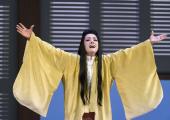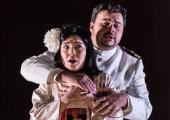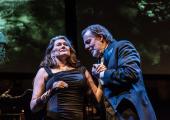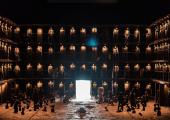DVD/Blu-ray: Ludwig
Visconti and Helmut Berger give beauty depth in the tragedy of the Bavarian king
No-one has ever matched costume drama to psychological depth quite like Luchino Visconti.
No-one has ever matched costume drama to psychological depth quite like Luchino Visconti.

"È un'immensa pietà" - "it's heartbreaking," rather than "it's a huge pity" - sings consul Sharpless of "Butterfly" Cio-Cio San's fatal belief that her American husband will return to her.

It felt good to be encountering Shakespeare at his most political with a world event to smile about, for once (hailing, of course, from this brilliant Dutch company's homeland). It felt even better to emerge six hours later spellbound and deeply moved by the triumph of the personal, albeit in a kind of love-death, after so many power-games.


At the conclusion of a year in which Britishness has come so resoundingly to the fore of the national debate – and with a play that at the time of its writing, 1605-6, was engaging with that concept no less urgently – the first impression made by Gregory Doran’s King Lear is how far removed it looks from any traditional sense of "British".

So we’re less than a week away from America’s choice. Many in the States have presented it as a kind of Sophie’s Choice – an unbearable outcome no matter who they choose. On the one hand they have a racist, sexist, braggart bully who has been named in at least 169 federal lawsuits and is due to appear in court over allegations of child rape, while on the other, they have a professional politician who can’t use email properly. It must be agonising for them.

What would Glyndebourne, staging Madama Butterfly for the first time, bring to Puccini's most heartbreaking tragedy? Subtle realism, perhaps? Certainly the composer, along with his superb librettists Giacosa and Illica, offers plenty of opportunities. Yet director Annilese Miskimmon botches nearly every significant moment, and it's surely her fault if her three principals are as wooden as the suggestion of lacquered trees dominating the sets.

Enter the human - and superhuman demands for at least four of the singers - in the second, towering instalment of Wagner's Ring cycle. It says so much for Opera North's achievement so far that no one fell in any way short of the sometimes insane vocal demands. There were only varying degrees of characterisation and commitment, none of them less than fine.

Britten fathomed Phaedra's passion for her stepson in a shattering quarter of an hour's dramatic cantata. Euripides' Hippolytus takes about 90 minutes in the playing. Director Kryzsztof Warlikowski's fantasia on the Phaedra myth is more than twice that long, but it's worth every riveting or disconcerting minute thanks largely – but by no means exclusively – to the encyclopedic range of Isabelle Huppert.

"Unjustly neglected masterpiece" is a cliché of musical criticism, and usually an exaggeration. Romanian master Enescu's vast journey through aspects of the Oedipus myth seemed like an unacknowledged great among 20th century operas through the medium of the starrily-cast EMI recording with José van Dam as the noblest Greek of all; after Martinu's Julietta and Szymanowski's King Roger, here was the last titan to be properly served by a top UK production.